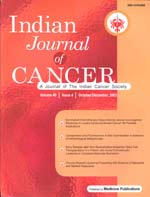
|
Indian Journal of Cancer
Medknow Publications on behalf of Indian Cancer Society
ISSN: 0019-509X
EISSN: 0019-509X
Vol. 47, No. 2, 2010, pp. 166-172
|
 Bioline Code: cn10042
Bioline Code: cn10042
Full paper language: English
Document type: Research Article
Document available free of charge
|
|
|
Indian Journal of Cancer, Vol. 47, No. 2, 2010, pp. 166-172
| en |
Molecular analysis of oral squamous cell carcinoma: A tissue microarray study
Solomon, M. C.; Carnelio, S. & Gudattu, V.
Abstract
Background : An intriguing aspect of Oral Squamous Cell Carcinomas (OSCC) is its behavioral disparity. Among patients who present with the similar clinicopathological features, some have a better prognosis than others. Identification of molecular alterations responsible for this may contribute to a greater understanding of tumor behavior. Tissue microarray (TMA) approach is a high throughput technology that enables analysis of multiple molecular targets simultaneously without causing any morphological alteration to tissue specimens.
Aim and Objective : To assess the tumor behavior based on the expression of p53, Bcl-2 and E-cadherin using TMA technology.
Settings and Design : This was a case series analysis using tissue microarray technology.
Materials and Methods : Formalin-fixed Paraffin-embedded (FFPE) tissue blocks of histological proven cases of OSCC (n = 30) were retrieved from the department archives. Tissue microarray blocks were constructed; 4 ΅m thick sections were cut and immunostained for p53, Bcl-2 and E-cadherin.
Stastistical Analysis : Mean (SD) was used to summarize age, frequencies with percentages was used to summarize categorical variable and Chi-square test was used to find association between histopathology evaluation and expression of Bcl-2, p53, E-cadherin.
Results and Conclusion : Bcl-2 was the most frequently expressed biomarker. The expression of Bcl-2 was inversely related to the degree of differentiation (P = 0.005). The follow-up data showed that 63.6% of the cases that were positive for both Bcl-2 and E-cadherin were disease-free following treatment. Tissue microarray technology is a promising way to analyse multiple biomarkers simultaneously. The molecular data obtained from TMA will enhance diagnosis, provide better prognostication and will improve cancer treatment for individual patients.
Keywords
Molecular screening, tissue microarray, oral squamous cell carcinoma
|
| |
© Copyright 2010 Indian Journal of Cancer.
Alternative site location: http://www.indianjcancer.com/
|
|
